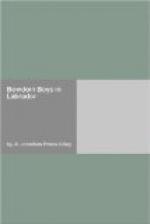[The Fourth of July] Meanwhile the night, clear but windless, has come on, and we drift along the Nova Scotia coast, lying low and blue on our northern board. The Fourth dawns rather foggy, but it soon yields to the sun’s rays and a good breeze which bowls us along toward the Cape. An elaborate celebration of the day is planned, but only the poem is finally rendered, due probably to increased sea which the brisk breeze raises incapacitating several of the actors for their assigned parts. The poem, by the late editor of ’91’s “Bugle,” is worthy of preservation, but would hardly be understood unless our whole crowd were present to indicate by their roars the good points in it.
At night our constant follower, the fog, shuts in, and the captain steering off the Cape, we lay by, jumping and rolling in a northeast sea, waiting for daylight to assist us to Cape Canso Harbor and the Little Ant. About six next morning we form one of a fleet of five or six sail passing the striped lighthouse on Cranberry Island, and with a rush go through the narrow passage lined with rocks and crowded with fishermen. Out into the fog of Chedebucto Bay we soon pass and in the fog we remain, getting but a glimpse of the shore now and then, till we reach Port Hawkesbury.
Jona. P. Cilley, Jr.
* * * * *
Onboard the “Julia A. Decker,”
Off st. John’s
bay, Newfoundland.
We are bowling along with a fine southwest wind, winged out, mainsail reefed and foresail two-reefed, and shall be in the straits in about two hours. The Julia is a flyer. Between 12 and 4 this morning we logged just 46 knots, namely, 13.5 miles per hour for four hours. I doubt if I ever went much faster in a sailing vessel. It is now about 10 o’clock, and we have made over 75 miles since 4.




